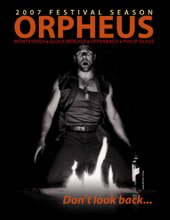Insider Rehearsal Report: A Blank Slate for New Orphée
Beginning work on any opera is exciting. However, beginning work on a modern opera that's only been staged 3 times in North America--that's a landmark moment for any company. The opera in question is, of course, Philip Glass' Orphée, which premiered in 1993 at the American Repertory Theatre in Cambridge, Massachusetts. Glimmerglass rehearsals began Monday. Director Sam Helfrich created a open atmosphere by using the first meeting to share his conceptualization of the show and encourage discussion amongst the cast and crew. Artistic and General Director Michael MacLeod began the rehearsal by introducing himself and the idea behind the season-- why Orpheus? To follow the distinguished 29-year tenure of Paul Kellogg, MacLeod searched for an imaginative way to make a mark on the company for his first season. To his surprise, three of perhaps the most famous operas based on the Orpheus myth had never been done at Glimmerglass, and it only seemed appropriate to do a season of Orpheus in 2007, the 400th anniversary of the first widely-recognized opera, Monteverdi's L'Orfeo. "The four operas complement each other perfectly," he said. "You can't ask for a wider range of style."
Artistic and General Director Michael MacLeod began the rehearsal by introducing himself and the idea behind the season-- why Orpheus? To follow the distinguished 29-year tenure of Paul Kellogg, MacLeod searched for an imaginative way to make a mark on the company for his first season. To his surprise, three of perhaps the most famous operas based on the Orpheus myth had never been done at Glimmerglass, and it only seemed appropriate to do a season of Orpheus in 2007, the 400th anniversary of the first widely-recognized opera, Monteverdi's L'Orfeo. "The four operas complement each other perfectly," he said. "You can't ask for a wider range of style."
Unique style won't be a problem for Helfrich, who is directing the only modern opera of the season. Glass' Orphée is based directly on the 1950 film by French director Jean Cocteau, which integrated modern film techniques such as reverse footage. Helfrich and the show's designers made a conscious decision to move away from the staging and scenery of the film version. "It's a beautiful movie, and with beautiful movies, it's easy to get lured into aesthetics. I thought, we have to get into this piece in some other way."
The piece, as well as the movie it's based on, presents a host of puzzles. Helfrich touched on this, discussing the second to last scene in the opera, where the Princess lets Orpheus go, supposedly for some greater good. "That's a huge question without an easy answer," he said. Conductor Anne Manson pointed out similar challenges with the score. "One of my first frustrations in looking at the score was that the orchestration reveals so little about the inner lives of the characters. The music doesn't give you clear answers."
Fortunately, with no clear answers, the potential for creativity in all areas of the production process is nearly limitless. For Helfrich, rehearsals are a mental process, complementing the physical process of staging. He encourages the actors and the audiences to talk about these questions. "This piece will be a success to me if I leave the audience not only asking what just happened, but dying to talk about it."
